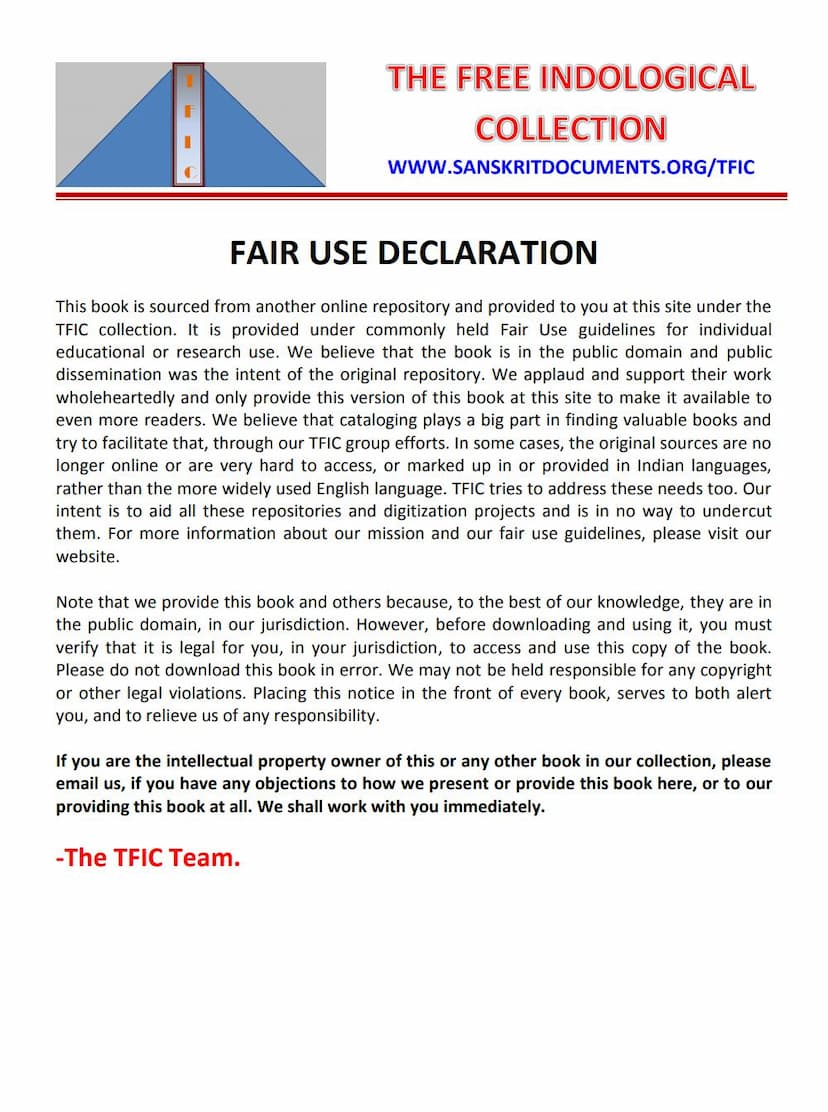Jain Prakashak Stavanavali Part 01
Added to library: September 2, 2025

Summary
This document, titled "Jain Prakashak Stavanavali Part 01," is a collection of devotional songs (Stavans) and some ethical verses attributed to Gopalchand. The book was published by Jain Prakashak Mandal, Ahmedabad. The fair use declaration at the beginning clarifies that the document is provided for educational and research purposes and is believed to be in the public domain.
The book begins with a prologue (Prastavna) by the author, Gopalchand. He expresses his gratitude to Lord Arihant and explains that the book contains various types of devotional songs sung in different meters and styles such as Kundaliya, Doha, Bhujang, Gajal, Kera, Garbi, Lavani, and Bijnara. It also includes some separate verses on ethics and morality. The author acknowledges that this is his first attempt and requests the readers to kindly point out any errors. He also mentions his intention to publish a second part of this book in the near future.
The main body of the book consists of a series of "Pad" (verses or songs), each with a title indicating the meter or style of singing and the specific deity or devotional theme. These include:
- Pad 1 to Pad 20: These are primarily devotional songs in various meters, praising different Tirthankaras (Jain spiritual teachers) like Rishabh, Ajit, Sambhav, Chandraprabhu, Shreyans, Vasupujya, Vimal, Anant, Dharmanath, Shantinate, Mallinath, Munisuvrat, Neminath, Parshvanath, and Mahavir. Many of these songs describe the glories of the Tirthankaras, their divine attributes, and the devotion of their followers. Some verses also express the poet's personal devotion and requests for liberation.
- Pad 21 to Pad 40: This section continues with more devotional songs, many focusing on the story of Neminath and Rajul, their separation, and Rajul's devotion. There are also songs praising other Tirthankaras like Adinath (Rishabh) and Parshvanath. Some songs express repentance for past deeds and a desire for spiritual progress.
- Pad 41 to Pad 46: This section contains further devotional songs and verses, continuing themes of devotion to Jain Tirthankaras, spiritual guidance, and seeking liberation.
- Kakavali ni Sajhay (Page 31-34): This is a didactic section composed in a specific meter, likely meant to be sung. It provides moral and ethical guidance, covering virtues like truthfulness, charity, forgiveness, non-violence, and the importance of adhering to Jain principles. It uses a question-and-answer format in some verses, addressing common human failings and offering advice.
- Shri Ajitnath Maharaj ni Lavani (Page 34): This is a devotional song in the Lavani meter dedicated to Lord Ajitnath.
- Panch Tirath ni Aarti (Page 35): This section presents five Aartis (songs of worship) dedicated to significant Jain pilgrimage sites and Tirthankaras, including Shatrunjaya, Shantinate, Neminath, Parshvanath, and Mahavir.
- Mangalik Deepak (Page 36): This is a song of auspiciousness, often sung during festivals and celebrations.
- Diye (Page 36): This is another short devotional piece, possibly sung during Diwali or other celebrations.
- Stavan (Page 37): This section contains a devotional song emphasizing the importance of remembering God's name and the transient nature of life.
- Sarvopayogi Niti (Page 37): This section presents a list of thirty points of practical ethical and moral advice, covering various aspects of daily life, relationships, and spiritual conduct.
Overall, "Jain Prakashak Stavanavali Part 01" is a valuable resource for Jain devotional literature, offering a collection of songs that express devotion, narrate stories of Tirthankaras, and impart moral teachings according to Jain philosophy. The language used is Gujarati, and the style is lyrical and devotional.